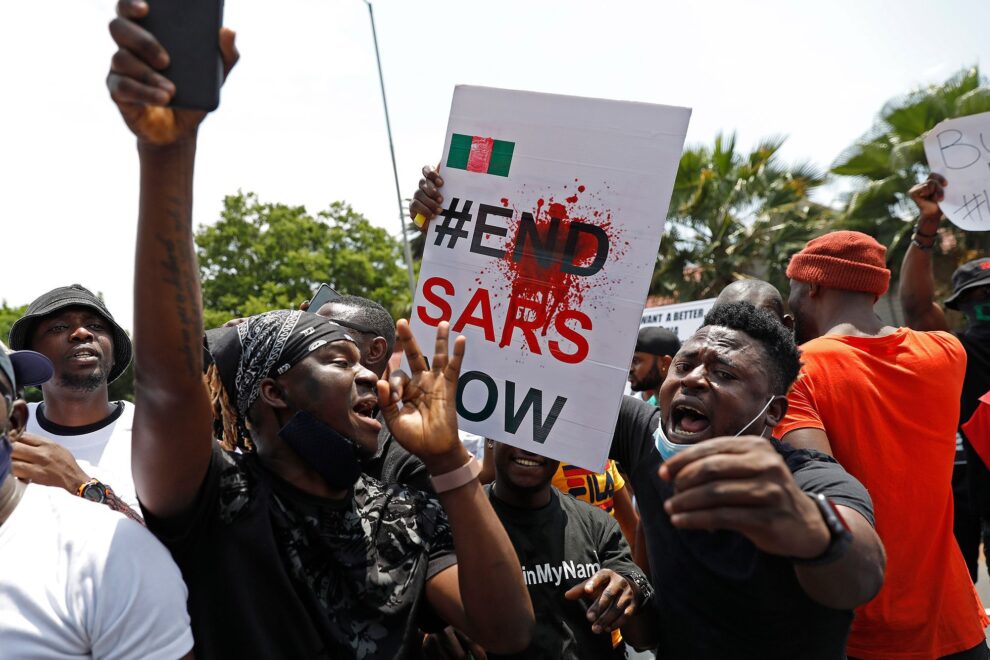
(Bloomberg) — Last year, Aubrey Hruby took two Egyptian venture capitalists on a tour of Nigeria’s technology-startup scene. After five days of meetings with top entrepreneurs, she was convinced the expedition was a success.
Hruby, co-founder of Tofino Capital, a U.S. fund that specializes in tech firms in emerging markets, hired a driver to take the two visitors back to Lagos airport. Their car got pulled over by police, on grounds of turning without a signal. A second Uber ride was also stopped, and this time the officials accused the investors of being terrorists. Going through their suitcases, they found $1,000 in cash and refused to hand it back.
“They eventually let them go and they made their flights but they were so traumatized,” said Hruby, who is also a senior fellow with the Atlantic Council’s Africa Center. “I don’t know if they will ever come back.”
For those working in Nigeria’s startup industry, experiences of this nature are wearily familiar. Their efforts to push back against the violence have put the sector at the heart of widespread protests against police brutality that have swept through the country since early October. The Nigerian government’s move to quell the demonstrations has resulted in the deaths of least 69 people across both sides, according to the state, while a round-the-clock curfew was imposed for three days last week on Lagos, Africa’s biggest city. It has since been relaxed to night hours only.
Tech workers have contributed money and free services to support the demonstrations. Those include Justin Irabor, the founder of Eden, a Lagos-based online platform that sources people to help with housework, who said he donated about $1,300. Activists have encouraged donors to use Bitcoin after Flutterwave, a local payment-services platform, stopped working, according to the Feminist Coalition, a local group helping raise funds.
The call for donations has even attracted the attention of Twitter Inc. Chief Executive Officer Jack Dorsey, who joined Google Africa in sending a series of supportive tweets using the movement’s #EndSARS hashtag, which relates to the notorious Special Anti-Robbery Squad at the heart of the protests. The show of solidarity came after Dorsey visited Nigeria in 2019 to meet with the founders of several tech startups.
While police corruption is endemic in Nigeria, members of the country’s tech industry have complained that they have suffered more than most. They are seen as easy targets due to a tendency to carry expensive laptops and other gadgets, coupled with a perception they may be well off, according to Oo Nwoye, founder of Lagos advisory firm TechCircle.
The victimization risks taking its toll on Nigeria’s booming sector as it encourages would-be entrepreneurs to emigrate to safer countries such as Germany, Nwoye said. The country’s tech companies raised about $122 million last year, compared with almost $500 million for the whole continent, according to a report by Disrupt Africa. This month, Stripe Inc., the U.S. payment-services giant, agreed to pay $200 million to acquire Lagos-based Paystack to jump-start expansion in Africa.
Getting Shot
Adedeji Olowe, the chief executive officer of Trium Networks, a technology venture-capital firm in Lagos, has been active in the sector for almost two decades. He said he was stopped and searched by SARS in January.
“I was ransacked, and had my phone rummaged through — even though I’m a senior executive within the tech and venture capital space,” he said. “I feared for my life, knowing that getting shot would see no one held accountable.”
Nosa Obasek, a freelance developer, was stopped by police in 2015 while dropping off a friend in his old Mazda. The officers called them fraudsters after spotting a MacBook Pro in his friend’s bag, he said, then demanded over $2,000 in bribes.
“For the first four weeks after the incident, going out was a problem,” Obasek said. “When I see police, I still turn back immediately if there’s a way. I still panic at the sight of them.”
Many employees of startups in Lagos, including Paystack, have been sharing similar stories online since the demonstrations began.
The scale and duration of the upheaval has unnerved financial markets, and the nation’s stocks and international bonds have weakened. The International Monetary Fund had forecast that gross domestic product was already set to contract 4.3% this year due to the Covid-19 pandemic, and the Lagos Chamber of Commerce and Industry has estimated lost output as a result of the protests of at least 700 billion naira ($1.8 billion).
While tech firms fear the potential withdrawal of international investors, many are focusing on using their skills to help those impacted by the unrest. Applications and websites have been developed to document police brutalities, while some tech startups are working on a program that will block prosecuted officers from using platforms created by Nigerian developers, according to TechCircle’s Nwoye.
Citizens Gavel, which provides legal representation for victims of police brutality, is also developing software to highlight good police officers and to shame bad ones, founder Nelson Olanipekun said.
“When you celebrate officers that are doing well, it is expected that they would also influence the system positively,” he said. “At present, there is no encouragement for doing good in the police force.”
For more articles like this, please visit us at bloomberg.com
Subscribe now to stay ahead with the most trusted business news source.
©2020 Bloomberg L.P.











Add Comment